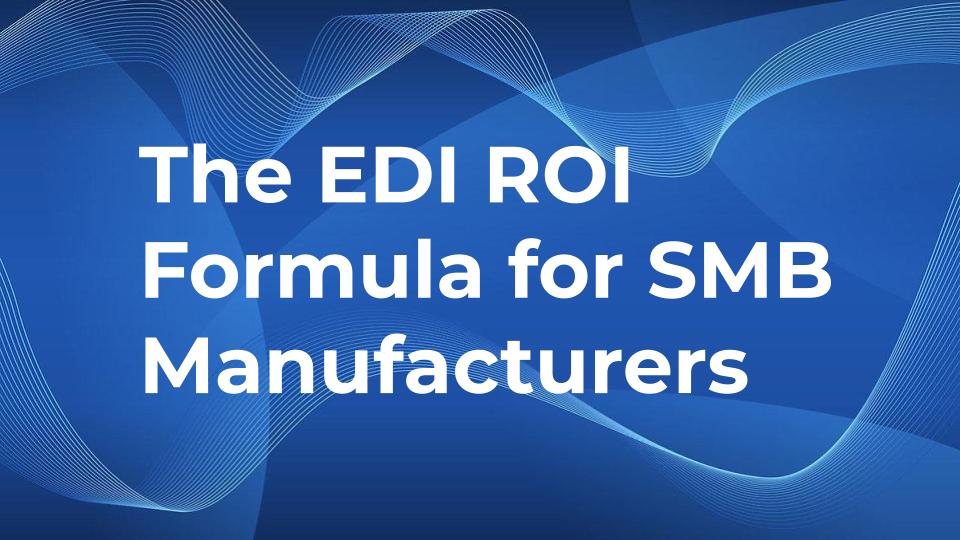
As you compare business software providers, You'll see the terms “EDI” and “API” used often. Since there are so many acronyms used to describe various technologies used in business operations, it can be confusing to figure out which one does what. Both EDI and API essentially do the same thing – transfer data from one computer to another. EDI has been around longer than API and is more widely used, but API is growing in popularity.
Electronic Data Interchange (EDI) is the exchange of information between two business partners. The information exchanged could be anything from a purchase order to a bill of lading.
EDI was created to replace paper-based business transactions. Instead of relying on people to fill out numerous forms and physically mail them or fax them, the information can be entered into a program and sent securely to anywhere in the world.
For decades, EDI has been the standard technology used to transmit business data in a variety of industries, including retail, manufacturing, logistics, healthcare, and more. Some major companies, like Walmart and Caterpillar, require their vendors to be EDI compliant.
Due to the time and cost-savings provided by EDI, it is widely used around the world. However, there is a new alternative to EDI on the market: API.
Application Programming Interface (API) is a standard technology used to sync applications in real-time. Whenever a website allows you to register an account using your existing Facebook or Gmail account, they are using Facebook or Google's API and your login information to pull your profile data.
The API acts as a middleman between two applications, allowing changes on one end to be reflected on the other end in real-time. APIs have made our lives much easier when it comes to the mobile applications we use and the innovative business software we can implement.
There are tons of companies that build their software as an extension of an existing platform by using data from their open API. In fact, for every major B2B software platform, such as Salesforce, there is an entire economy of supporting software and businesses built around their API.
Some people would like to see API completely replace EDI. API is the newer technology and EDI has been around for decades. However, EDI's age works to its advantage, contrary to most technology.
While API is a powerful technology for synchronizing web applications, it still hasn't come close to replacing EDI for all information transactions in business. Part of this is due to globalization and the fact that modern companies often have suppliers and other vendors that are spread out across the world – especially throughout China.
If your business has dealt with Chinese manufacturers, you are well aware that fax machines are still commonly used in international trade, despite the fact that fax machines are virtually obsolete in America. In fact, you probably use an electronic service to send digital faxes to your partner's' physical fax machine.
EDI has stood the test of time in a similar manner that email has – it's simple, it works, and there's an extensive infrastructure already in place to facilitate its use. In rural areas of China and across the world where affordable manufacturing is prevalent, internet access isn't always reliable.
Although modern applications transfer EDI data via the internet, older applications rely on phone lines. This allows reliable communication between rural China and your business in America, or wherever you are. API requires stable Internet access to function properly. So while this might not cause a problem for certain business operations, it can slow down your supply chain in other areas.
However, EDI hasn't remained unchanged since its creation. EDI has come a long way from its inception, especially with the use of cloud technology. EDI remains the essential technology for scaling your business.
If you'd like to know more about EDI can play a role in your business, we are happy to help! BOLD VAN offers a variety of EDI solutions. From cloud-based to full EDI system implementation, we've got the right solution for you. Speak to an EDI Solutions Specialist today: 844-265-3777.

SMB manufacturers can quickly calculate the ROI of switching to an EDI system by comparing the detailed costs of manual processing against significant labor and error reductions. Discover a practical, step-by-step model that highlights measurable financial and operational benefits, making it easier for decision-makers to see real savings and improved efficiency.

A practical guide to setting up and managing 940, 945, and 856 EDI flows with 3PLs. Covers mapping, testing, compliance, scalability, and cost control to protect SLAs and reduce fulfillment errors.

Learn how EDI envelopes (ISA, GS, ST), control numbers, and version mismatches cause trading partner test failures—and how to prevent rejections, delays, and compliance issues with automated envelope management.